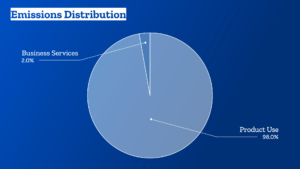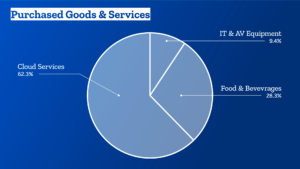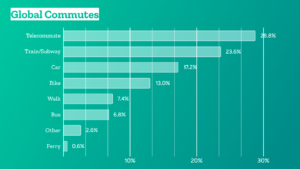Projects/Sustainability/Environmental Impact and Mitigation
Mozilla's Climate Commitments and Activities
Contents
2019 Greenhouse Gas emissions (GHG) baseline assessment
We released our 2019 GHG report on November 17, 2020.
Mozilla’s overall emissions in 2019 amounted to: 799,696 mtCO2e (metric tons of carbon dioxide equivalent).
- Business Services and Operations: 14,222 mtCO2e
- Purchased goods and services: 8,654 mtCO2e
- Business travel: 2,657 mtCO2e
- Events: 1,199 mtCO2e
- Offices and co-locations: 1,195 mtCO2e
- Remotees: 194 mtCO2e
- Commute: 147 mtCO2e
- Product use: 785,474 mtCO2e
There are two major buckets:
- Mozilla’s impact in terms of business services and operations, which we calculated with as much primary data as possible;
- The impact of the use of our products, which makes up roughly 98% of our overall emissions.
In 2019, the use of products spanned Firefox Desktop and Mobile, Pocket, and Hubs.
Their impact is significant, and it is an approximation. We can’t yet really measure the energy required to run and use our products specifically. Instead, we are estimating how much power is required to use the devices needed to access our products for the time that we know people spent on our products. In other words, we estimate the impact of desktop computers, laptops, tablets, or phones while being online overall.
For now, this helps us get a sense of the impact the internet is having on the environment. Going forward, we need to figure out how to reduce that share while continuing to grow and make the web open and accessible to all.
The emissions related to our business services and operations cover all other categories from the GHG protocol that are applicable to Mozilla.
For 2019, this includes 10 offices and 6 co-locations, purchased goods and services, events that we either host or run, all of our commercial travel including air, rail, ground transportation, and hotels, as well as estimates of the impact of our remote workforce and the commute of our office employees, which we gathered through an internal survey.
How we look at this data
- It’s easy to lose sight of all the work we’ve got to do to reduce our business services and operations emissions, if we only look at the overarching distribution of our emissions:
- If we zoom in on our business services and operations emissions, we’ll note that our average emissions per employee are: 12 mtCO2e.
- There is no doubt plenty of room for improvement. Our biggest area for improvement will likely be the Purchased Goods and Services category. Think: more local and sustainable sourcing, switching to vendors with ambitious climate targets and implementation plans, prolonging renewal cycles, and more.
- In addition, we need to significantly increase the amount of renewable energy we procure for Mozilla spaces, which in 2019 was at: 27%.
- And while a majority of Mozillians already opt for a low-carbon commute, we’ll explore additional incentives here, too:
- We will also look at our travel and event policies to determine where we add the most value, which trip is really necessary, how we can improve virtual participation, and where we have space for more local engagement.
Climate Commitments
We can’t save the planet without people, and we understand that the internet is an incredibly powerful tool to help us draw the attention to what needs to happen.
- Mozilla is firmly committed to being carbon-neutral.
- Mozilla will significantly reduce its GHG footprint year over year aligning to, and aiming to exceed, the net zero emissions commitment of the Paris Climate Agreement.
- Mozilla commits to leading openly by sharing materials, tools, and methodologies.
- Mozilla will explore approaches to develop, design, and improve products from a sustainability perspective, including seeking collaborations to further amplify impact.
Mitigation and Carbon Offsets
Doing right by the environment cannot be about simply paying off your emissions. In order to be carbon-neutral today, we invested in high quality carbon offsets to mitigate our 2019 impact for business services and operations. While these offsets are an important tool to mitigate emissions that we are not yet able to avoid, they do not provide or stimulate the sort of transformation that our societies need in order to truly be sustainable.
The most effective climate mitigation strategy is avoiding emissions, and Mozilla will continue to reduce its share while working with allies and partners to amplify our ambitions.
Such a transformation requires new mindsets and a high degree of organisational and cultural change. Training our staff and providing a range of different incentives to improve our environmental impact will be integral to achieving this.
Next steps
In 2021, we will double down on our reduction efforts and develop implementation plans with each part of our organisation.
This will include switching more of our offices to renewable energy, reviewing our travel policies, exploring options for cloud optimisation, developing toolkits for product integrity and design principles, and more. We will share details on our process and targets as we refine them.

